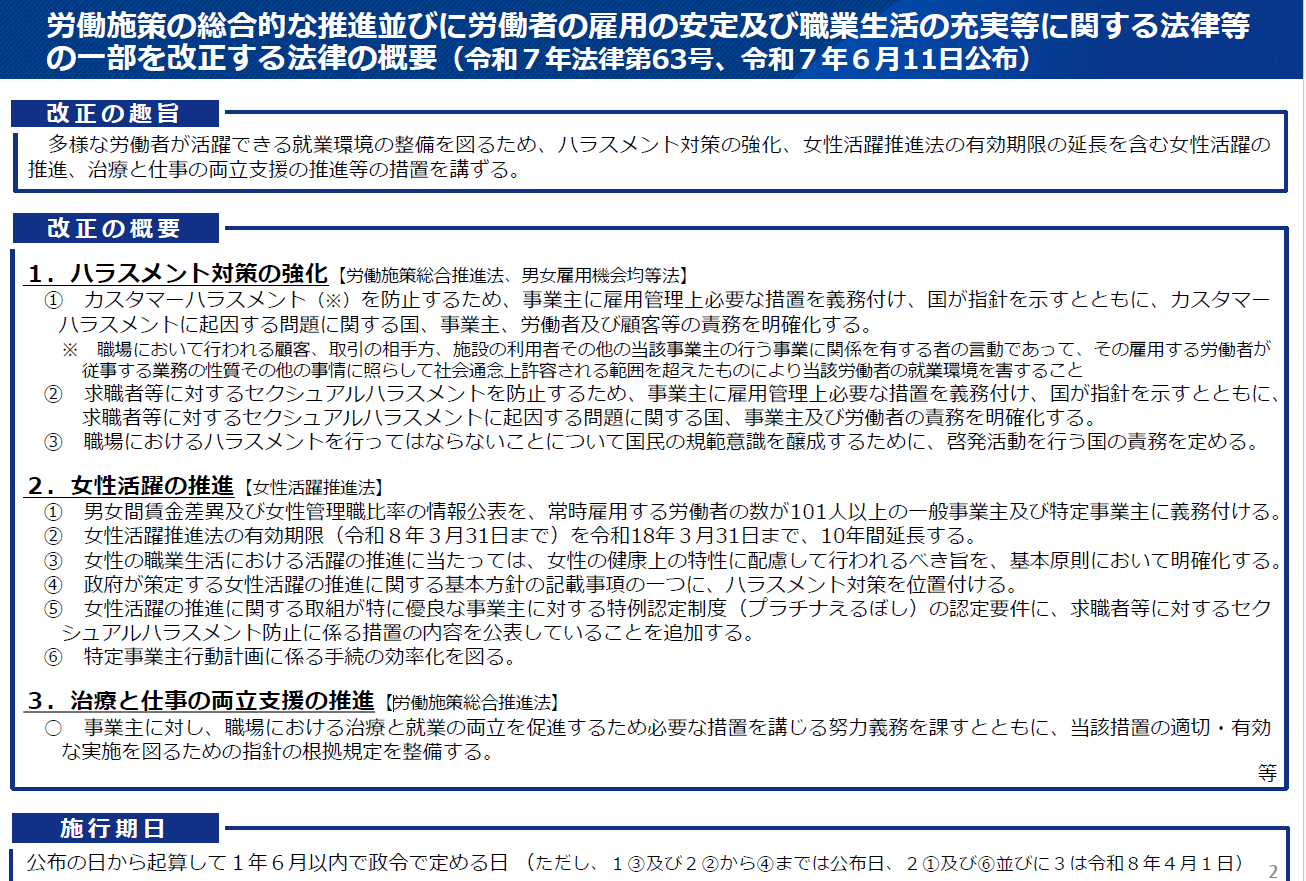Japan Labor Policy Council 2025 labor law reforms
Oct 30, 2025

Labor Policy Council (85th Meeting) — Key Points of Japan’s 2025 Labor Law Reforms
Introduction: A Critical Discussion Shaping Japan’s Future Work Rules
On October 27, 2025, the 85th Labor Policy Council (Ministry of Health, Labour and Welfare) held a significant meeting to shape Japan’s “rules of work” for the coming years.
Main topics included:
- Customer harassment (Kasuhara) prevention measures
- Disclosure of gender-based wage differences
- Support for childcare and flexible working arrangements
All three themes share the central ideas of “human dignity” and “productivity balance.”
This article summarizes the reform background, policy intent, and implications for corporate compliance based on official MHLW materials.
Chapter 1: Position of This Council — The “Coordination Table” of Labor Policy
Summary: The 85th Labor Policy Council serves as a key advisory body that consolidates industry and labor perspectives before legislative changes. Discussions focused on structural reforms addressing workforce shortages and diversified working styles.
Q. What is the Labor Policy Council?
The Labor Policy Council, established under Article 6 of the Ministry of Health, Labour and Welfare Establishment Act (January 6, 2001), deliberates on important labor policy matters at the minister’s request.
It consists of 30 members appointed by the Minister of Health, Labour and Welfare—10 representing public interest, 10 representing workers, and 10 representing employers—with a renewable two-year term.
Key Feature of the 85th Meeting: Three Major Labor Law Reforms
Underlying issues discussed include:
- Severe labor shortages
- Institutional adaptation to diverse working styles
- Complex workplace issues (harassment, pay gaps, work-life balance)
Rather than isolated amendments, this meeting discussed a structural redefinition of Japan’s “new workplace norms.”
Chapter 2: Mandatory Customer Harassment Prevention (Labor Policy Promotion Act Revision)
Summary: Under the revised Labor Policy Promotion Act, employers will be legally required to take preventive measures against “serious nuisance acts by customers,” ensuring that employees’ work environments are not harmed.
Background: Customer Interaction as a New Risk Area
Abusive language, violence, and excessive demands from customers have surged in sectors like retail, healthcare, and public services.
While workplace harassment laws cover superiors and colleagues, they have not explicitly covered customer-originated misconduct.
Key Points
- Defines “serious nuisance acts by customers” as a condition harming employees’ work environments.
- Establishes employer obligation to prevent such acts through policies and internal measures.
- Recognizes “Customer Harassment” as the third major type of harassment under Japanese law.
Required Corporate Measures
1. Clarify and disseminate company policy (manuals, posters, etc.)
2. Establish consultation and reporting systems
3. Create post-incident protocols (care, police coordination)
4. Implement deterrent measures (customer codes of conduct)
Practical Legal Advice (by Attorney Shinji Sumida)
Small and medium-sized companies should prioritize creating a consultation desk and formal response protocol.
A clear public statement such as:
“We welcome customer feedback but will not tolerate abusive conduct that harms our employees’ dignity.”
should be displayed company-wide.
Chapter 3: Expanded Gender Pay Gap Disclosure (Act on the Promotion of Women’s Participation)
Summary: The Act on Promotion of Women’s Participation will expand pay gap disclosure obligations from companies with 301+ employees to those with 101+. Companies must also explain the reasons behind any gaps.
Background: Japan’s 22% Gender Pay Gap
According to Cabinet Office data (2022), women’s annual income is still over 22% lower than men’s in most age groups. The government identifies this as a structural issue requiring transparency and accountability reforms.
Main Revisions
- Disclosure obligation threshold: 301+ → 101+ employees
- Disclosure of gender pay differences and ratio of female managers
- Clarification of “reason/explanation” section in official guidelines
Impact on Corporate Practice
- HR data preparation by job grade and position
- Documentation explaining legitimate pay differentials
- Improved transparency for job seekers, employees, and investors
Chapter 4: New Certification for Women’s Health Support
Summary: A new certification called “Eruboshi Plus” will recognize companies that implement strong health support systems for women (e.g., menstrual, fertility, and menopause support) as part of career advancement policies.
Background: From “Performance” to “Health Foundations”
The policy focus is shifting from measuring women’s participation to supporting the health conditions that enable sustained careers.
Key Reform Proposals
- Creation of “Eruboshi Plus” certification for companies with health support programs
- Relaxed criteria for entry-level (1-star) certification to expand access
Practical Implications
- Integrate health support into HR strategy
- Revise work regulations for flexible/shorter hours
- Strengthen internal consultation and training systems
Chapter 5: From “Obligation” to “Structural Design” — The New Era of Labor Policy
Summary: These reforms signal a paradigm shift: from “compliance obligations” to “organizational structure design.” The government aims to embed dignity, fairness, and health into the core of workplace systems.
Common Structural Themes
- Customer Harassment: Protecting dignity through safe workplaces
- Pay Gap Disclosure: Ensuring fairness via data and accountability
- Health Support: Enabling work-life balance through flexible design
Chapter 6: Timeline and Next Steps
Summary: Related ministerial guidelines and ordinances are expected to be officially announced around December 2025, with enforcement from April 2026. Companies should prepare for compliance by reviewing upcoming manuals and Q&A guidance from MHLW.
Frequently Asked Questions (FAQ)
Q1. What does the mandatory customer harassment prevention entail?
A1. Under the revised Labor Policy Promotion Act, employers must implement preventive measures—such as policy declaration, consultation desks, and training—to protect employees from severe misconduct by customers.
Q2. Which companies must disclose gender pay gap data?
A2. Companies with 101 or more employees will be required to disclose pay gap data and provide explanations for disparities under the revised Act on Promotion of Women’s Participation.
Q3. What is the new “Eruboshi Plus” certification?
A3. “Eruboshi Plus” recognizes companies with comprehensive women’s health support systems, including flexible work, medical consultation, and wellness programs.
Q4. When will the reforms take effect?
A4. Official guidelines are expected in December 2025, with enforcement beginning April 1, 2026. Companies should prepare policy revisions and internal training accordingly.
You are welcome to contact us via the Contact Form to discuss and for more information.

